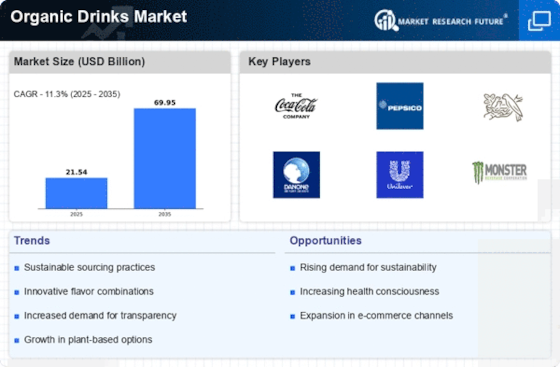Top Industry Leaders in the Organic Drinks Market

The organic drinks market has witnessed significant growth in recent years, driven by increasing consumer awareness of health and sustainability. In this competitive landscape analysis, we delve into key players, strategies, market share determinants, emerging companies, industry trends, and recent developments in 2023.
Key Players:
Prominent players in the organic drinks market have positioned themselves as leaders through a combination of product quality, ethical sourcing, and strategic market presence. Key players include:
Hain Celestial (U.S.)
Suja Life LLC (U.S.)
the Coca-Cola Company (U.S.)
Danone SA (France)
Purity Organic LLC (U.S.)
the Better Drinks Co. (New Zealand)
Parker's Organic Juices Pty Ltd (Australia)
Bison Organic Beer (U.S.)
James White Drinks Ltd. (U.K.)
PepsiCo Inc. (U.S.)
Nutrition & Sante Iberia S.L.(Spain)
Republica Coffee (Australia)
The WhiteWave Foods Company (U.S.)
Alnatura Produktions & Handels GmbH (Germany)
Parkers Organic Juices PTY LTD (Australia)
Strategies Adopted:
Key players employ various strategies to maintain a competitive edge and navigate the dynamic organic drinks market.
- Product Diversification: Companies focus on expanding their product portfolios to cater to diverse consumer preferences. This includes introducing new flavors, functional beverages, and innovative combinations to attract a broader audience.
- Sustainable Sourcing: Ethical and sustainable sourcing of organic ingredients has become a cornerstone strategy. Companies highlight their commitment to environmentally friendly practices, resonating with consumers who prioritize sustainability.
- Marketing and Branding: Building a strong brand image is crucial. Effective marketing campaigns emphasize the organic and natural attributes of products, creating awareness and establishing trust among consumers.
- Distribution Networks: Strategic partnerships with distributors and retailers help in expanding the reach of organic drinks. A robust distribution network ensures products are accessible to a wider audience.
Market Share Analysis:
Several factors influence market share dynamics in the organic drinks market.
- Certifications: Organic certifications play a vital role in gaining consumer trust. Companies with recognized organic certifications are likely to have a competitive advantage, especially in markets where consumers actively seek such products.
- Innovation and Trends: Staying ahead of trends and continuously innovating product offerings is critical. Companies that align with emerging consumer preferences, such as functional beverages or unique formulations, can capture a larger market share.
- Consumer Education: Educating consumers about the benefits of organic drinks and transparently communicating sourcing practices can enhance brand credibility. Informed consumers are more likely to choose products from companies with a commitment to transparency.
- Price Competitiveness: While organic products often come with a premium price, maintaining competitive pricing strategies is essential. Striking a balance between quality and affordability is crucial for market share retention and growth.
News & Emerging Companies:
News within the organic drinks market often centers around emerging companies introducing novel products and market trends.
- Emerging Beverage Categories: New entrants are exploring innovative beverage categories within the organic space. This includes organic energy drinks, wellness shots, and plant-based milk alternatives, addressing evolving consumer demands.
- Functional Ingredients: Companies are incorporating functional ingredients such as adaptogens, superfoods, and botanicals to enhance the health appeal of organic drinks. Emerging brands leverage these ingredients to differentiate their offerings.
Industry Trends:
Investment trends within the organic drinks market reflect the industry's response to changing consumer preferences and market dynamics.
- Technology Integration: Investments in technology, including e-commerce platforms and digital marketing, showcase a commitment to meeting consumers where they are. Companies are increasingly leveraging online channels to enhance visibility and accessibility.
- Supply Chain Resilience: Investments in supply chain resilience and transparency are gaining prominence. Companies are adopting traceability technologies to provide consumers with detailed information about the sourcing and production of organic ingredients.
Competitive Scenario:
The organic drinks market is characterized by intense competition among key players striving to differentiate themselves through sustainability, innovation, and consumer-centric strategies. The ability to adapt to market trends, maintain quality, and effectively communicate brand values shapes the overall competitive scenario.
Recent Development
The industry-wide commitment to reducing carbon footprints. Several key players announced initiatives to implement sustainable packaging solutions and reduce overall environmental impact. This shift reflects a growing consumer demand for eco-friendly practices across the organic drinks sector, influencing companies to prioritize sustainability in their operations.











